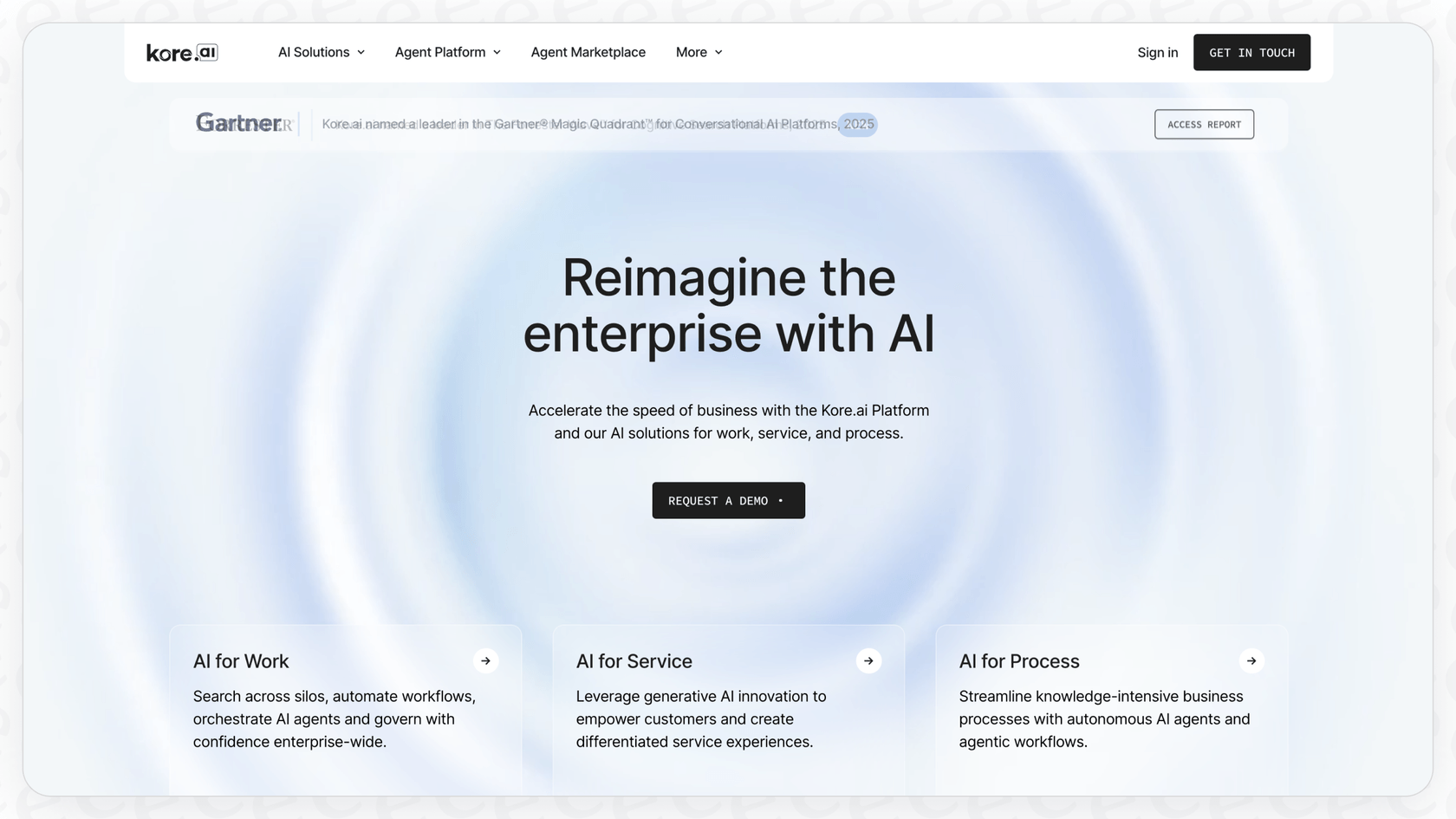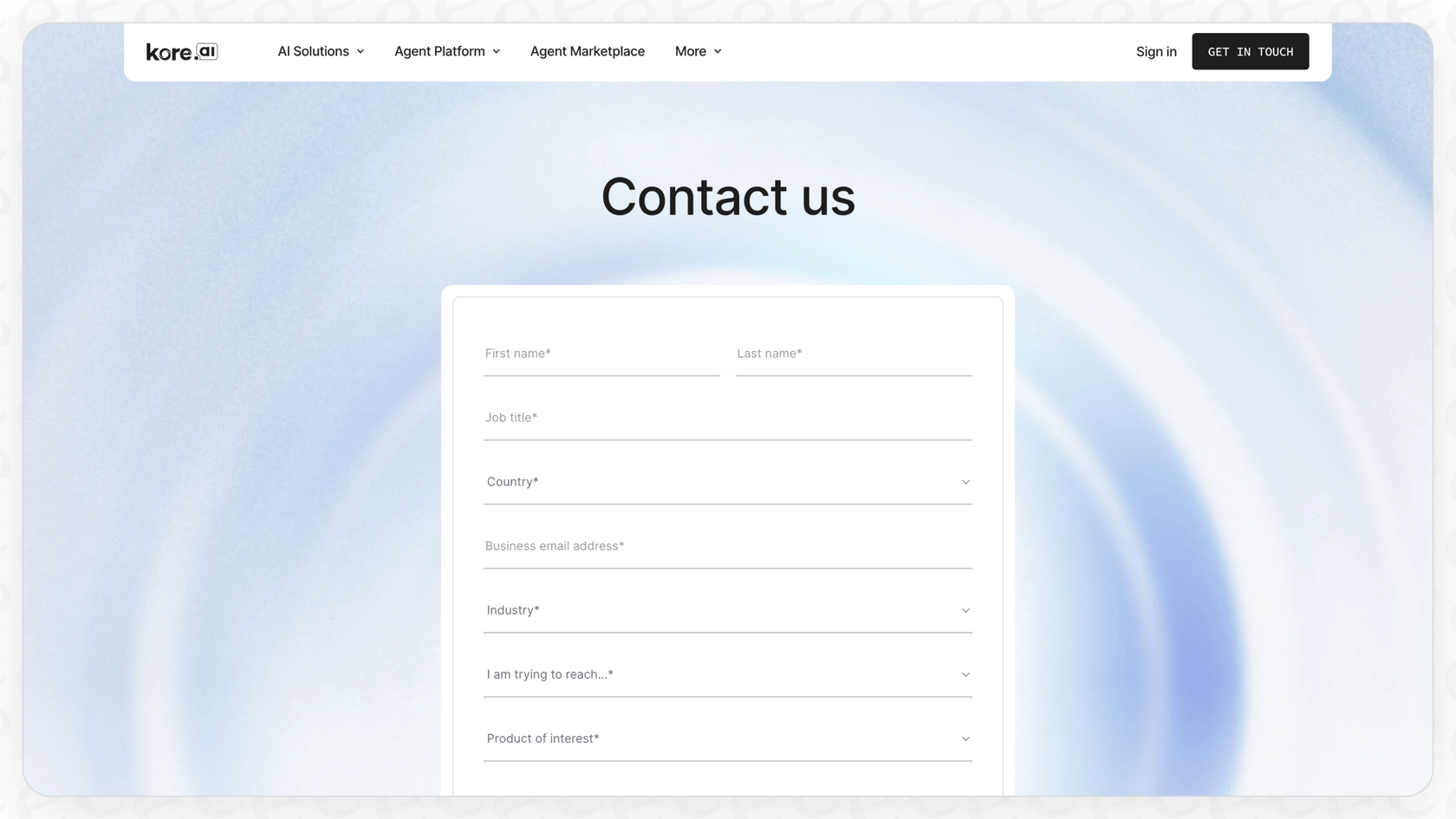
Trying to figure out how much an enterprise AI platform actually costs can feel like you’re being intentionally kept in the dark. So many companies hide their prices behind "Contact Sales" buttons, forcing you into demos and long-winded contracts that somehow leave you with more questions than you started with. Kore.ai, a big name in conversational AI, is pretty much the poster child for this approach.
This guide is here to cut through the noise. We’ve done the digging for you, sifting through technical docs, user reviews, and competitor notes, to give you a straight-up breakdown of all the known Kore.ai pricing tiers. We’ll cover everything from their supposed self-serve plans to their six-figure enterprise deals so you can get a real sense of what you’d be paying.
For teams that just need to get things done, clear and predictable pricing isn’t a nice-to-have; it’s everything. Let’s pull back the curtain and see what Kore.ai is really asking for.
What is Kore.ai? Understanding the platform behind the pricing
Before we get into the dollars and cents, it helps to know what Kore.ai does and who it’s built for. At its core, Kore.ai is an AI platform for large companies that want to build and manage their own smart chatbots and voice assistants.

They split their tools into three main buckets:
-
AI for Work: Automating internal stuff, like HR or IT tasks.
-
AI for Service: Handling customer-facing support and sales.
-
AI for Process: Helping with complex, knowledge-heavy business operations.
Their main technology, the XO Platform, is the toolkit for designing and running these AI agents. When you see their client list includes giants like Morgan Stanley, Pfizer, and Coca-Cola, it’s obvious they’re targeting massive corporations, especially those in tightly regulated fields like finance and healthcare. This focus on the big players is exactly why their pricing is built for custom, large-scale projects instead of simple, out-of-the-box tools.
A detailed look at Kore.ai pricing plans
Good luck finding official pricing on Kore.ai's website. If you try to go to their main pricing page, you’ll hit a 404 error. Seriously. This means you’re left to piece together the puzzle from their documentation, partner sites, and third-party reviews. Here’s a detailed look at what we managed to uncover.

The self-serve pricing plans (for smaller teams)
Even though Kore.ai is all about the enterprise, several sources mention that lower-tier, self-serve plans exist. These are likely aimed at individual developers or smaller teams who want to test the waters. The information out there is a bit messy, but here's a summary based on data from sites like TopAdvisor and SoftwareFinder.
| Plan Name | Reported Monthly Price (Annual Billing) | Key Features Included | Best For |
|---|---|---|---|
| Essential | $50 - $60 | Chatbot builder, multilingual interface, KPI tracking, basic analytics, and standard integrations like Salesforce and Zendesk. | Individuals or small teams just starting out with a single chatbot project. |
| Advanced | $150 - $180 | Everything in Essential, plus a conversation flow builder, A/B testing, and role-based access control. | Businesses that need more control, customization, and better analytics for their bots. |
Other reviews mention a free plan with a 5,000 requests/month limit and a pay-as-you-go Standard Plan. All this conflicting info just proves the point: with Kore.ai, there’s no single, clear source for pricing.
The enterprise pricing plan (for large-scale deployment)
This is Kore.ai's bread and butter. The Enterprise plan is a completely custom deal that requires going through their full sales process to get a quote. Based on what we’ve seen in industry reports and reviews, most of these deals start at around $300,000 per year.
This plan gives you access to everything Kore.ai has to offer, including:
-
The option for on-premise deployment
-
Advanced security and compliance features
-
Unlimited usage and higher request caps
-
"Universal Bots" that can manage multiple AI agents at once
-
24/7 premium support
This tier is unapologetically built for huge companies with big IT teams, deep pockets, and seriously complex AI needs.
How the Kore.ai billing model works
The price is one thing, but how you get billed is a whole other story. According to Kore.ai's own documentation, their automation tools are billed based on "billing sessions."
Here’s the catch: a single billing session is a 15-minute block of conversation. This means a 31-minute chat with a customer doesn't count as one conversation, it counts as three separate billing sessions (0-15 mins, 16-30 mins, and 31 mins to the end).
This time-based system can make your costs wildly unpredictable. One busy month with customers who have more complicated problems could send your bill through the roof. It’s a world away from simpler, more honest models. For example, eesel AI offers straightforward plans based on a set number of monthly AI interactions, with no weird time-based sessions or per-resolution fees. You always know exactly what you’re paying.
The hidden costs and limitations of the Kore.ai pricing model
The price you’re quoted for a platform like Kore.ai is just the tip of the iceberg. The real cost often includes a ton of hidden expenses for setup, maintenance, and dealing with the platform’s built-in roadblocks.
A long and complicated setup
Enterprise platforms are not plug-and-play. Getting started with Kore.ai is often a months-long project that needs dedicated developers, project managers, and AI specialists. User reviews are full of comments about the steep learning curve, especially for non-technical folks who just want to build a simple bot to help their team.
This slow, high-effort setup is a total dealbreaker for teams that need to move fast. Modern tools like eesel AI are designed to get you up and running in minutes, not months. With one-click integrations for help desks like Zendesk and Freshdesk, you can connect your tools and start automating support without writing any code or waiting for a developer to free up.
eesel AI Agent automatically answering and resolving a ticket in Zendesk.
Heavy engineering and maintenance needs
Once Kore.ai is finally live, the work isn’t over. Customizing conversation flows, adding new integrations, and tuning the AI’s performance all require ongoing help from engineers. This adds a huge, often unbudgeted, overhead cost. Your team ends up spending more time fiddling with the tool than actually using it to help customers.
This is where a self-serve tool makes all the difference. eesel AI gives non-technical teams a no-code workflow editor and a simple prompt editor. You can define your AI's personality, tone, and what it's allowed to do (like look up order details or escalate a ticket) without needing a developer to step in for every little change.

No easy way to test and roll out changes
One of the biggest headaches with a heavy enterprise platform is the "big bang" launch. Reviewers note that Kore.ai doesn't have a simple testing sandbox, which makes it hard to tweak AI responses or see how they'll perform without pushing changes live to real customers. This slows everything down and creates the risk of a clunky customer experience.
There’s a much better way to do this. A key feature of eesel AI is its powerful simulation mode. It lets you safely test your AI setup on thousands of your own past support tickets in a private sandbox. You get a clear forecast of your resolution rates and cost savings, letting you fine-tune everything before a single customer sees it. Then, you can roll out automation bit by bit, starting with certain types of tickets and expanding as you get more comfortable.

How to choose the right AI platform: Considering more than just pricing
So, how do you figure out which path is right for you?
A platform like Kore.ai could be a fit if you're a massive enterprise with a team of AI engineers already on staff, a nine-month timeline for implementation, and a non-negotiable requirement for on-premise hosting.
For pretty much everyone else, a self-serve platform is the smarter bet. If your team cares about speed, flexibility, predictable costs, and empowering your existing support staff, a modern, agile tool will get you there so much faster.
Here’s a quick comparison of the two approaches:
| Feature | Kore.ai | eesel AI |
|---|---|---|
| Onboarding Time | Months | Minutes |
| Pricing Model | Confusing, tiered, with custom quotes | Transparent, predictable monthly plans |
| Ideal User | Large enterprises with dedicated dev teams | Support teams of all sizes (from startups to enterprise) |
| Testing Capability | Limited; requires deploying to production | Powerful simulation on your historical tickets |
| Ease of Use | Steep learning curve; needs technical skills | Radically simple and self-serve |
| Key Advantage | Deep enterprise features and on-premise option | Speed, control, and transparency |
The clear alternative: Transparent pricing and instant value
While Kore.ai is a powerful platform, its murky pricing, massive setup effort, and reliance on engineers just don't work for most modern teams. The world of AI moves way too fast to wait months for a solution that’s a pain to manage and has a price tag that changes with the weather.
eesel AI was built on a totally different idea. We believe powerful AI should be simple, accessible, and honest. Our platform is built around a few core principles:
-
Go live in minutes: Connect your helpdesk and knowledge bases like Confluence or Google Docs with a single click. No sales calls, no mandatory demos, no developers needed.
-
You're in total control: Use our simple, no-code editor to define exactly what your AI does and says. You can customize its persona, limit its knowledge, and build powerful workflows that actually fit your team.
-
Test with confidence: Use our simulation mode to see exactly how your AI will perform on your real-world data before you ever turn it on for customers.
-
Transparent pricing: Our pricing is right there on our website for everyone to see. You pick a simple monthly plan you can cancel anytime, with no hidden fees or surprise charges.

This is just a smarter, more efficient way to bring AI into your workflow. You get all the power of an enterprise tool without any of the enterprise-level headaches.
This video explores how to build, operate, and scale enterprise AI agents, including a discussion on pricing and adoption playbooks relevant to Kore.ai pricing.## Final thoughts on Kore.ai pricing
At the end of the day, Kore.ai pricing is complicated, hard to find, and built for huge companies with deep pockets and a lot of technical resources. The high sticker price of an enterprise plan doesn't even begin to cover the hidden costs of a long setup process and the constant need for engineering support.
For businesses that need a powerful, flexible, and affordable AI solution without all the enterprise baggage, a new generation of self-serve platforms offers a much clearer path. They prove you don't have to give up control or capability to get a tool that's easy to use, fast to deploy, and has a price you can actually understand.
Ready for an AI platform with transparent pricing and instant setup? Try eesel AI for free and see how quickly you can automate your support, without ever having to talk to a salesperson.
Frequently asked questions
Kore.ai's official pricing page leads to a 404 error, making it difficult to find clear information directly. Details must often be pieced together from documentation, partner sites, and third-party reviews, pushing potential customers toward sales interactions.
Reported self-serve "Essential" and "Advanced" plans range from $50-$180 per month (annual billing) for smaller teams. Enterprise Kore.ai pricing typically starts around $300,000 annually, requiring a custom quote after engaging with their sales team.
Yes, significant hidden costs include a months-long setup process requiring dedicated developers and specialists, and ongoing engineering for customization and maintenance. The platform also lacks an easy testing sandbox, which can add to operational overhead.
Kore.ai uses a "billing sessions" model where each session is a 15-minute block of conversation. A single long interaction can count as multiple sessions, leading to unpredictable and potentially higher costs compared to simpler interaction-based models.
The custom, enterprise-level Kore.ai pricing model is best suited for massive corporations, particularly in regulated industries like finance and healthcare. These organizations typically have large IT teams, substantial budgets, and complex, long-term AI project needs.
While some third-party sources mention lower-tier "Essential" and "Advanced" self-serve plans, consistent and official details are difficult to verify. The platform's primary focus and pricing structure are geared towards large enterprise deployments, making smaller-scale access less transparent.
Kore.ai pricing is known for being complex, custom-quoted, and often opaque, requiring a full sales process. In contrast, alternative platforms like eesel AI offer transparent, predictable monthly plans that are clearly displayed on their website, prioritizing ease of access and clear cost structures for all team sizes.
Share this post

Article by
Kenneth Pangan
Writer and marketer for over ten years, Kenneth Pangan splits his time between history, politics, and art with plenty of interruptions from his dogs demanding attention.







